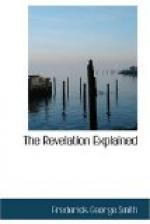This special reign of a thousand years above is doubtless brought to our view for the express purpose of making the history of the triumph of Christianity continuous. When interrupted on earth, the scene is suddenly transferred to Paradise; then when the woman comes out of the wilderness and the public reign on earth begins again, while the woman is being prepared as a bride for the coming of the Lamb, the scene, as the following description in verse 9 also will show, is again transferred to earth. The reign above does not in reality cease with the expiration of the thousand years, but we are permitted to obtain a view of it only for that length of time during the down-trodden state of the church on earth. This reign of the martyrs’ above is placed in direct contrast with the public reign on earth during the same time, which consisted of multitudes of people worshiping the beast, recieving his image and his mark. What the “thrones” on which they sat and the “judgment” given them signifies, I do not know for certain, but it is doubtless the same exalted privilege and authority which Christ promised to all his over-comers—to sit with him on his throne. Chap. 3:21.
7. And when the thousand
years are expired, Satan shall be
loosed out of his prison,
8. And shall go out to
deceive the nations which are in the four
quarters of the earth, Gog
and Magog, to gather them together to
battle: the number of
whom is as the sand of the sea.
9. And they went up on
the breadth of the earth, and compassed
the camp of the saints about,
and the beloved city: and fire
came down from God out of
heaven, and devoured them.
10. And the devil that
deceived them was cast into the lake of
fire and brimstone, where
the beast and the false prophet are,
and shall be tormented day
and night for ever and ever.
The loosing of Satan, or the dragon, is the first important point to be considered. Before this matter can be rightly understood, however, we must take into account carefully certain facts regarding his binding. It was not the dragon as a political power that Christianity attacked (it did not labor to that end), but it was its huge public system of false belief that was overthrown. This great system, as opposed to Christianity, can all be summed up under the one word infidelity. Infidel signifies “a heathen; one who disbelieves in Christ, or the divine origin and authority of Christianity.”—Webster. This system was positively an antichristian power that sought by every possible means to destroy the religion of Jesus and to blot out his very name. It failed in the attempt. It was bound. During the long reign of Popery, when the doctrine was be-a-Catholic-or-die, infidelity could not publicly lift its head in the sense in which it was cast down by the early Christians. It had no power over the nations of the Apocalyptic earth to then deceive




